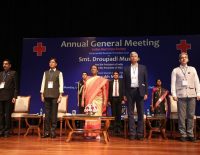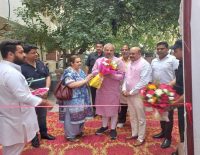QR Code to scan human brain, Google map for neurosurgery at AIIMS

The Department of Neurosurgery AIIMS, New Delhi, on Wednesday announced a series of transformative initiatives aiming to revolutionize patient care. With innovative training modules and technologies, the department of neurosurgery aims to equip neurosurgeons with new techniques and foster a culture of continuous medical education.
In a first of its kind innovation for neurosurgical education, the department has developed low-cost training modules that are reshaping neurosurgical education. Among these innovations is a remarkably simple and low-cost ultrasound training module designed to aid neurosurgeons in performing biopsies and localizing deep brain lesions. This ingenious model, crafted from everyday materials transcends traditional boundaries to offer an immersive hand- on learning experience. By utilizing agar or jelly set within a glass jar to simulate the brain interface, and strategically placing berries to mimic brain lesions, trainees are offered a remarkably realistic environment to refine their skills. This affordable and easily accessible training module plays a crucial role in enhancing neurosurgeons’ ability to localize lesions.
The department has also developed novel solutions, including a low-cost endoscopic spine surgery simulator and a device for practicing microsuturing with readily available materials. These DIY devices, made from items such as mobile phones, optical cables, and cardboard boxes, provide surgeons with hands-on training at a fraction of the cost of foreign-made alternatives, costing less than 2000 rupees. Beyond their affordability, these simulators provide comprehensive training, from honing microsuturing skills to mastering endoscopic techniques, empowering surgeons with critical surgical proficiency. The ingenious integration of mobile phones can also allow experts to remotely provide telementoring to young surgeons, offering invaluable guidance and support previously unavailable.
The department has collaborated with industry leaders Microsoft and apoQlar to harness the power of Hololens 2 and VSI holomedicine software, creating holographic images for a deeper understanding of complex surgical anatomy, particularly in high cervical surgeries. Enhanced learning experiences using mixed reality devices like HoloLens 2, help students to visualize complex anatomical structures in 3D, interactively explore medical scenarios, and gain practical insights.
“The neurosurgery department is at the forefront of neurosurgical innovation with an impressive record of treating over 4500 patients per year and caring for over 45000 patients via its outpatient clinic. Central to its mission is the development of young neurosurgeons’ skills, not only within its own walls but also throughout India and many neighboring countries”, said the hospital in a statement.








Comments